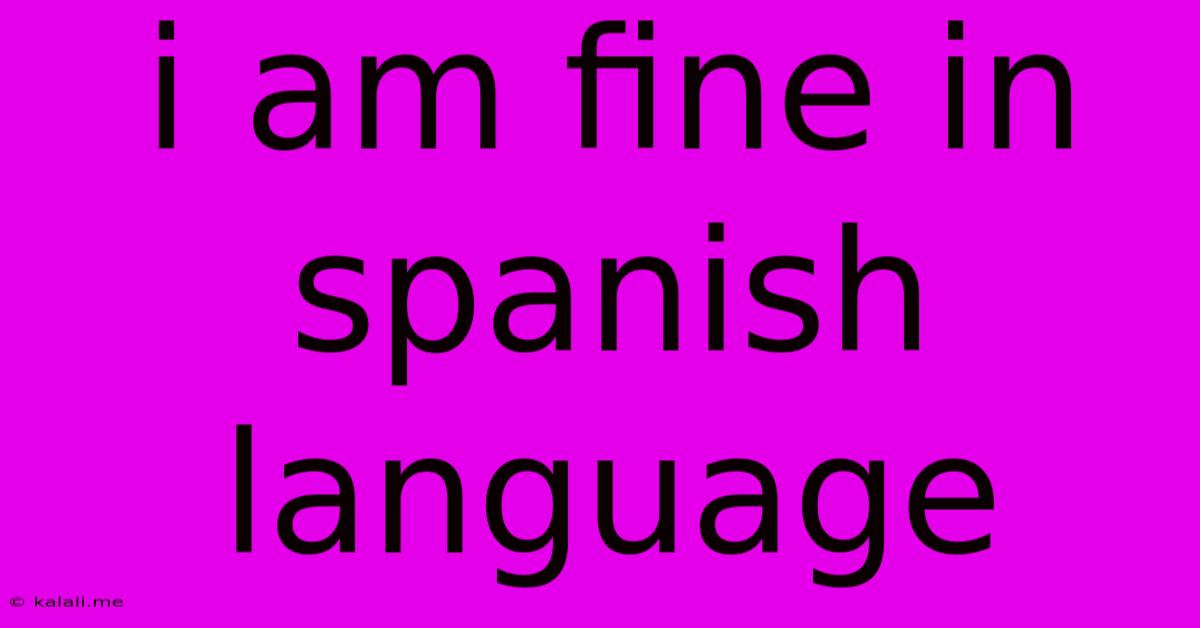I Am Fine In Spanish Language
Kalali
May 22, 2025 · 2 min read

Table of Contents
Saying "I'm Fine" in Spanish: More Than Just "Bien"
So, you want to know how to say "I'm fine" in Spanish? While "Bien" is the most common and straightforward translation, understanding the nuances of the Spanish language reveals a richer tapestry of ways to express your well-being. This goes beyond simple vocabulary; it's about choosing the right phrase to fit the context and your relationship with the person you're speaking to. This article will explore various options, helping you sound more natural and fluent.
Beyond "Bien": Exploring Different Ways to Say "I'm Fine"
While "Bien, gracias" (Fine, thank you) is perfectly acceptable and widely understood, it might sound a little stiff in informal settings. Let's delve into some alternative expressions that will add depth and authenticity to your Spanish conversations:
-
"Estoy bien," which translates literally to "I am well," is a more formal yet still common way to respond. It's versatile and suitable for most situations.
-
"Estoy muy bien," adds emphasis, translating to "I'm very well" or "I'm doing great." Use this when you genuinely feel fantastic.
-
"Estoy perfecto/perfecta," (I'm perfect) is a more emphatic way to express feeling exceptionally well. Remember to use perfecto for masculine and perfecta for feminine.
-
"Más o menos," meaning "more or less," is a great option if you don't feel fantastic but also don't want to complain. It's a subtle way to communicate that you're not feeling your best without elaborating.
-
"Regular," translates to "okay" or "so-so" and is another good option for when you're not feeling particularly great or terrible.
-
"Bien, ¿y tú?" This translates to "Fine, and you?" This is a polite and common way to respond while also showing interest in the other person's well-being. It encourages a reciprocal exchange, making the conversation more engaging. This shows conversational fluency.
Context is Key: Choosing the Right Phrase
The best way to say "I'm fine" in Spanish depends heavily on the context. Consider:
-
Formality: "Estoy bien" is generally safe for most situations, while "Perfecto/Perfecta" is best reserved for close friends or informal conversations.
-
Your actual feeling: If you're not feeling great, don't force a positive response. "Más o menos" or "Regular" are honest alternatives.
-
The situation: A simple "Bien" might suffice in a quick exchange, but a more elaborate response might be appropriate in a more formal setting.
Mastering the Nuances of Spanish Greetings
Learning how to gracefully express your well-being is a significant step in mastering the Spanish language. Understanding these variations demonstrates a deeper grasp of the language and allows for more natural and engaging conversations. Remember to practice using these phrases in different contexts to build your confidence and fluency. With time, you’ll find the perfect expression for every situation.
Latest Posts
Latest Posts
-
Why Does The Wifi Keep Disconnecting On My Ipad
May 22, 2025
-
Best Pokemon Team X And Y
May 22, 2025
-
Does A Sim Card Come With A Phone Number
May 22, 2025
-
What Does It Say In The Bible About Eating Pork
May 22, 2025
-
Why Wont My Car Unlock With Remote Or Key
May 22, 2025
Related Post
Thank you for visiting our website which covers about I Am Fine In Spanish Language . We hope the information provided has been useful to you. Feel free to contact us if you have any questions or need further assistance. See you next time and don't miss to bookmark.